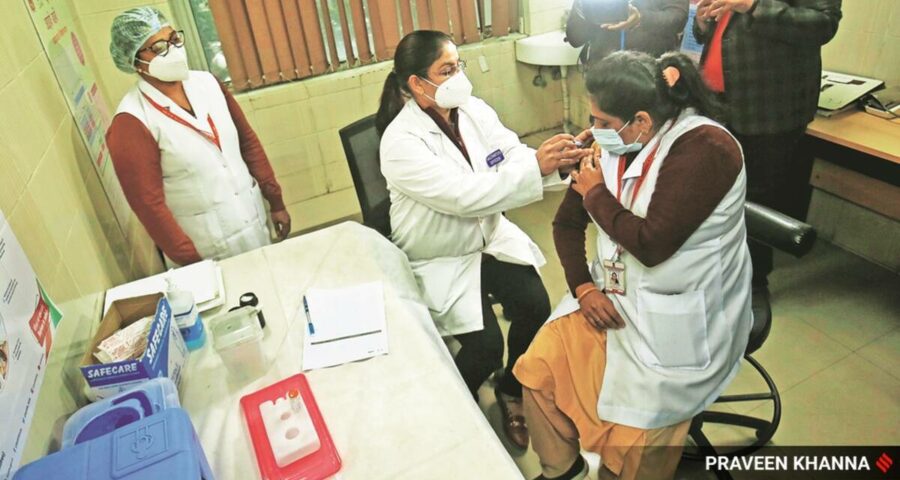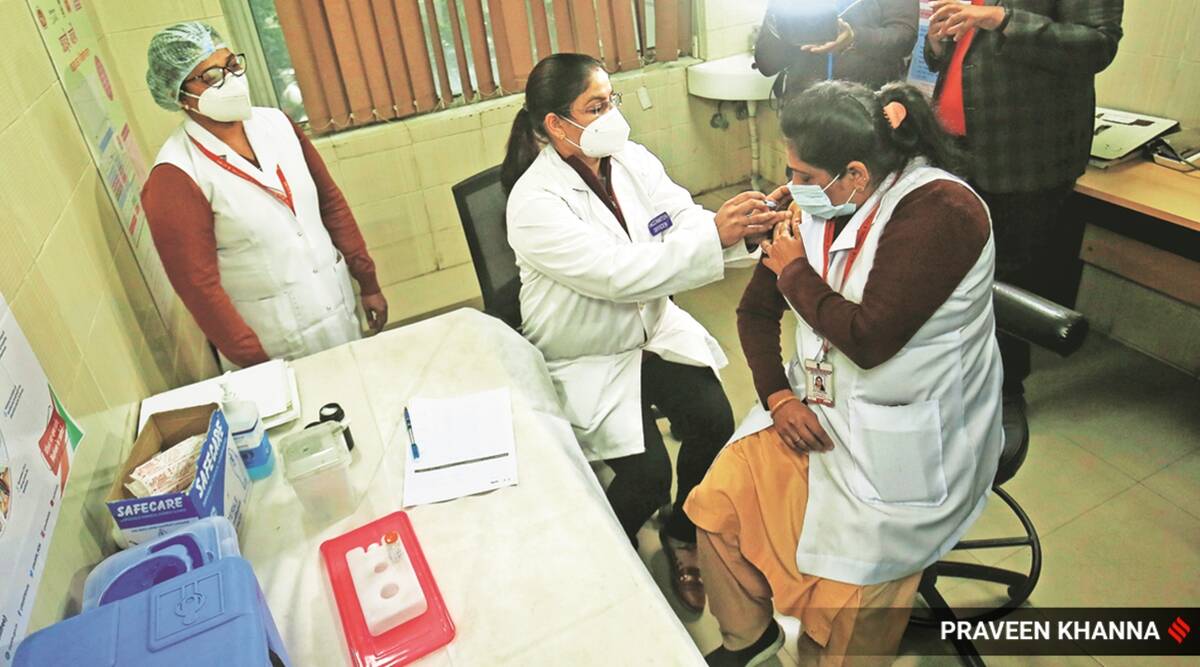On February 4, the authorities had aimed to vaccinate 948 individuals at nine sites, however, only 344 were vaccinated. The target for the frontline workers was 54, of which 39 received the shot.
In the Covid-19 vaccination in Chandigarh on Sunday, even as the administration had aimed to inoculate 1,106 people at 12 sites, including Police Hospital and ESI Ramdarbar, along with the healthcare workers— merely 371 people were vaccinated. Meanwhile, the target for the vaccination among frontline workers was 91, of which 81 were vaccinated.
On February 4, the authorities had aimed to vaccinate 948 individuals at nine sites, however, only 344 were vaccinated. The target for the frontline workers was 54, of which 39 received the shot. Similarly, 216 people were inoculated against a target of 500 at five sites on February 2.
On January 23, 345 people received the jab, against a target of 1,000 at eight sites. On January 21, 284 people received the shots at six sites, while the target was 600. On January 19, 204 healthcare workers were the first dose of the vaccine, with no major side effects reported, while on the day of the launch of the vaccination drive, January 16, as many as 374 healthcare workers were inoculated.
The data indicates, the number of people vaccinated is less than even 50 per cent of the target. However, in the last one week, there has been a slow, but steady rise in the number of people coming forward for the vaccination.
“In the first few days, we could sense an apprehension and fear among the healthcare workers, who were skeptical of the new vaccine and its side-effects, besides its long-term impact. Moreover, the Covid-19 positive cases are declining, which makes people think that they do not need a vaccine– It is precisely why, on January 16, many heads of departments at GMSH-16, including Director Health Services, opted to get a shot of the vaccine and remained at work following that as a confidence-building measure. Slowly, we have started getting a positive response from our staff from across the departments. I am positive that we will soon meet our targets. Now, we do not have to persuade people, as many are registering for the vaccine on their own. Doctors have been the role models, for as many as 12-15 of them, including private doctors, come forward every day to get vaccinated,” shared Dr VK Nagpal, Medical Superintendent, Joint Director, Health, at GMSH-16 and among the first to receive the Covishield vaccine on January 16.
Senior doctors and heads of departments have been regularly counselling their staff, communicating that no major side-effects have been reported by those who have been already vaccinated. The doctors have also been emphasising that the vaccine will not only protect them but their families as well. Physicians at the vaccination sites also offer to answer queries and clear doubts about the vaccine in a bid to help those who fear it. “Thankfully, no major side-effects have been reported in the first phase, apart from slight fever, body aches, and pain where the injection is administered. Many came to work a day after taking the shot, and this has given a boost to the drive,” added Dr Nagpal.
PGIMER Director Professor Jagat Ram and his wife Asha Kumari came forward to take the Covid-19 vaccine shots at the institute on February 6. Professor Ram and his wife were administered Covishield vaccines at the vaccination centre at Advanced Paediatric Centre. At least four hours after the vaccination, Professor Ram shared his experience and said that he and his wife had no adverse reactions. He urged others too to have faith in medical science and join the drive. The Director emphasised that there are no issues associated with the safety of the vaccine and added that the vaccine will have a protective effect against Covid-19. “This vaccine is safe and with minimal or no side effects. Mild reaction after the vaccination is a good sign because it reflects the immune system of the body is reacting to the vaccine and creating antibodies. Slight fever, body ache or joint pains could occur for a day or two, which will subside automatically, and people are free to contact experts,” said Dr Ram.
Professor Surinder S Pandav, Chairman of Covid-19 Vaccination Committee at PGIMER, while updating about the vaccination drive at PGIMER, said, “The vaccine drive is running smoothly and the response is consistently picking up. Since its beginning on January 16, we have successfully inoculated around 2,500 healthcare workers, comprising doctors, nursing officers, technicians and hospital and sanitation attendants and others, meaning thereby, our response rate to vaccination program is about 60 per cent, which is reasonable. The department heads are motivating their teams, and we have also made our vaccination schedules more flexible so that those who are busy on the designated day may opt for another date. We want to put forth the point that even as Covid-19 cases are declining, the pandemic is not over. We have to be cautious and vaccination will lower the infection rate and also there no major side-effects have been reported,” adds Dr Pandav, who received the first dose on January 16, and reported no pain or fever after the shot.
Dr Parvinder Chawla, Senior Consultant for internal medicine at Fortis Hospital in Mohali, said that more than 50 per cent of the hospital’s employees has taken the first dose of the vaccine and the percentage is even better among the doctors– with more than 60 per cent of doctors vaccinated. The seniors and HODs, he says, have been the torch bearers and role models with almost all of them having come forward to take the jab. “The younger ones still seem to be taking time to come forward to accept it, perhaps because they perceive their risk of having a severe infection to be low. We are trying to rely more on the word-of-mouth to spread this message. We believe, accepting the vaccine is akin to accepting to be a soldier. The will to contribute has to come from within.”
Dr Amit Kumar Mandal, the hospital’s Director of Pulmonology, Sleep and Critical Care, who was the first to get the jab, said that a lot has been discussed and debated about the Covid-19 vaccine and it is about time to be inoculated and stay protected. “There are two ways of getting the immunity, one is getting the infection and recovering from it and the other is getting the vaccine shot and developing the immunity, which is a wiser option.”
Head of Department of General Medicine at GMCH-32, Dr Sanjay D’Cruz said that right now the team at GMCH is collecting data to assess the response to the vaccine. The doctor says, over time, with the help of orientation and awareness programmes about the safety of the vaccine, clearing the staff members’ doubts regarding the side effects of the shot, and with personal interactions of the department heads with their teams, the response to the vaccine has improved– with almost 70 per cent of the residents vaccinated and all the faculty members of the Department of Medicine opting to take the first dose.
“We have posters and standees, among others things, in the vaccination areas to educate people. Many feel that as Covid-19 cases are coming down, they don’t need to take the vaccine. However, I want to emphasise that the infection may raise its head any time and come back, as we have seen in several other countries. The vaccine will help reduce the severity of the infection, check the spread of infection and bring down the overall infection rate. Till now, data indicates immunity for a period of three to four months, but it is too early to be completely sure. We are all learning. As no major adverse effects have been reported, the initial reluctance is gone, and I can say with confidence that there is no cause for concern,” said Dr D’Cruz.
Source: Read Full Article


